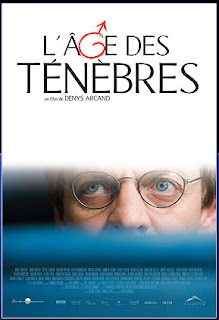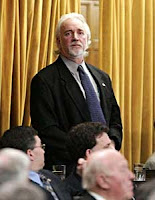 |  |
 | |
Showing posts with label canada. Show all posts
Showing posts with label canada. Show all posts
14 Sept 2008
Anti-Harper stickers in Vancouver
Seen on Davie Street in Vancouver tonight: little posters of Stephen Harper pasted to newspaper boxes and bus shelters.
I can't wait for the elections to be over – on both sides of the border.
30 Jul 2008
Vancouver PD vs NYPD for Critical Mass: protection vs assault
Critical Mass in Vancouver is a very mellow affair. Although there are sometimes incidents, it is predominantly peaceful and generally treated with equanimity. Not so in New York City, where a police officer assaulted a cyclist on Friday:
Contrast this with Vancouver, where Critical Mass is escorted by two police motorcycles who pace the rear of the pack, keeping cars from crowding the cyclists. The police even block traffic to allow the riders to congregate briefly on the bridges:
Obviously a single officer does not represent the entire NYPD, nor indeed his region or country, but the contrast is as striking as the assault. These attitudes and actions do not exist in a vacuum: they reflect the direction and values of the leadership and the society at large. The relationship between Critical Mass and the police is fairly representative of impressionistic differences between the East and West coasts of North America, and of the North and South divide between Canada and the US: senseless repression and harassment vs tolerance. I consider myself rather fortunate at times to live in the North and the West.
Contrast this with Vancouver, where Critical Mass is escorted by two police motorcycles who pace the rear of the pack, keeping cars from crowding the cyclists. The police even block traffic to allow the riders to congregate briefly on the bridges:
Obviously a single officer does not represent the entire NYPD, nor indeed his region or country, but the contrast is as striking as the assault. These attitudes and actions do not exist in a vacuum: they reflect the direction and values of the leadership and the society at large. The relationship between Critical Mass and the police is fairly representative of impressionistic differences between the East and West coasts of North America, and of the North and South divide between Canada and the US: senseless repression and harassment vs tolerance. I consider myself rather fortunate at times to live in the North and the West.
25 Jul 2008
Hedy Fry on C-61, the Canadian DMCA
Members of the Canadian government are on the take from US media interests who are trying to criminalize, well, everybody. My MP, Hedy Fry, is a wonderful woman and I like her very much on most issues, but given that the film industry is a big deal here in Vancouver I expected the worst on copyright. Since she wouldn't comment when I asked her about her own party's copyright bill (C-60), I was surprised when she offered an opinion about Bill C-61. Although the Conservatives are only going a little farther than her own party in selling out Canadian citizens, she says that "This Bill does not serve either consumer or creator well," and that she would not support it without amendment. Some notable highlights:
Dear Mr. LeDuc:
Thank you for your correspondence concerning Bill C-61, An Act to amend the Copyright Act.
As you are aware the previous Liberal government had tabled a Bill on this issue but it did not come to debate because of the election. The current Conservative Bill has been eagerly awaited since they announced their intentions, in December 2007.
Canada has signed two World Intellectual Property Organization (WIPO) treaties, but has not yet ratified them. The last time the Canadian Copyright Act was amended was in 1997 but these amendments did not address the WIPO treaty agreements. In the interim, communications technology has expanded rapidly. Everyone is in agreement that the Copyright Act has to be amended to reflect the impact of digital technology.
Bill C-61 should strike a balance between the right of creators to be reimbursed for their creative, intellectual property and the desire for consumers to have access to these creative works.
Indeed digital technology serves both the creator and the consumer well. It increases the reach and distribution of creative works as never imagined, before; which is precisefy what creators need and it gives consumers easy access to creative works that can entertain, enrich, and educate.
This Bill does not serve either consumer or creator well. It prescribes narrow, punitive solutions to a complex problem. In fact the Bill could well have the effect of curbing the use of digital technology, to the extent that it becomes useless. This would be a pity! As well, implementation of the measures in the Bill would be nearly impossible, unless one abandons all privacy rights or imposes locks on the digital technology that severely limits its application. How to monetize digital technology to reward the creator and allow free and open use by the consumer is challenging

- 2 -
As Liberals we believe that there should have been extensive consultations with legal experts, creators, distributors and conventional and digital media industries to find the right balance of solutions. It is typical of the Harper government that they do not consult but impose.
Liberals intend to begin these consultations over the course of the summer so that when the Bill comes to the House we can propose appropriate amendments. Moreover we believe that the Bill should be further subject to public scrutiny if it ever gets to committee stage. It could be that after we consult with the expert groups they believe that Bill C-61 is unsalvageable, in which case one would have to vote against the Bill and rewrite a new one.
These are exciting and challenging times in media communications technology that can broaden the consumption of arts and cultural products, in a manner unheard of since the invention of the printing press. The challenges seemed impossible then but solutions were found that led to a Renaissance of art and culture. We are at a similar point in history, now. We must not use a sledge hammer.
Once again, thank you for writing. Please feel free to contact my office if I may be of further assistance.
Sincerely,
(signed)
Hon. Hedy Fry, M.P.
Vancouver Centre
And finally, a scan of the letter:
"Everyone is in agreement that the Copyright Act has to be amended to reflect the impact of digital technology."Really? Everyone?!?
"How to monetize digital technology to reward the creator and allow free and open use by the consumer is challenging"...and it would be a challenge to finish that sentence, since it makes no sense whatsoever. Maybe "utilize" was the verb you were looking for?
"[...] since the invention of the printing press. The challenges seemed impossible then [...]"The text follows. Errors are hers (this letter is a mess). Proofreading, anyone?Which challenges were those? The challenges of the established order keeping people under control and in continued ignorance? I do see a strong parallel, but it's not an auspicious parallel.
| CONSTITUENCY OFFICE 106-1030 Denman St. Vancouver, B.C. V6G 2M6 Tel.: (604) 666-0135 Fax.: (604) 666_0114 |  HOUSE OF COMMONS CHAMBRE DES COMMUNES OTTAWA, CANADA K1A 0A6 | OTTAWA OFFICE Room 583 Confederation Bldg. House of Commons Ottawa, Canada K1A 0A6 Tel.: (613) 992-3213 Fax.: (613) 995-0056 | ||
| Hon. Hedy Fry, P.C., M.P. Vancouver Centre | ||||
Chuck LeDuc Vancouver, BC |
|
Dear Mr. LeDuc:
Thank you for your correspondence concerning Bill C-61, An Act to amend the Copyright Act.
As you are aware the previous Liberal government had tabled a Bill on this issue but it did not come to debate because of the election. The current Conservative Bill has been eagerly awaited since they announced their intentions, in December 2007.
Canada has signed two World Intellectual Property Organization (WIPO) treaties, but has not yet ratified them. The last time the Canadian Copyright Act was amended was in 1997 but these amendments did not address the WIPO treaty agreements. In the interim, communications technology has expanded rapidly. Everyone is in agreement that the Copyright Act has to be amended to reflect the impact of digital technology.
Bill C-61 should strike a balance between the right of creators to be reimbursed for their creative, intellectual property and the desire for consumers to have access to these creative works.
Indeed digital technology serves both the creator and the consumer well. It increases the reach and distribution of creative works as never imagined, before; which is precisefy what creators need and it gives consumers easy access to creative works that can entertain, enrich, and educate.
This Bill does not serve either consumer or creator well. It prescribes narrow, punitive solutions to a complex problem. In fact the Bill could well have the effect of curbing the use of digital technology, to the extent that it becomes useless. This would be a pity! As well, implementation of the measures in the Bill would be nearly impossible, unless one abandons all privacy rights or imposes locks on the digital technology that severely limits its application. How to monetize digital technology to reward the creator and allow free and open use by the consumer is challenging

As Liberals we believe that there should have been extensive consultations with legal experts, creators, distributors and conventional and digital media industries to find the right balance of solutions. It is typical of the Harper government that they do not consult but impose.
Liberals intend to begin these consultations over the course of the summer so that when the Bill comes to the House we can propose appropriate amendments. Moreover we believe that the Bill should be further subject to public scrutiny if it ever gets to committee stage. It could be that after we consult with the expert groups they believe that Bill C-61 is unsalvageable, in which case one would have to vote against the Bill and rewrite a new one.
These are exciting and challenging times in media communications technology that can broaden the consumption of arts and cultural products, in a manner unheard of since the invention of the printing press. The challenges seemed impossible then but solutions were found that led to a Renaissance of art and culture. We are at a similar point in history, now. We must not use a sledge hammer.
Once again, thank you for writing. Please feel free to contact my office if I may be of further assistance.
Sincerely,
(signed)
Hon. Hedy Fry, M.P.
Vancouver Centre
And finally, a scan of the letter:
4 Jul 2008
Sous le Grand Chapiteau
The last time I saw Cirque du Soleil was in 1991: Nouvelle Expérience in Atlanta, to which my mother invited me. That show was a revelation to me. It was also a very different time for that organization: just a small circus company, not the "entertainment empire" as it is described today. Then, it was just one touring show; now it has fourteen touring companies and six resident shows.
It was also distinctly non-English then, with very few words spoken at all, and the French nature of the show very distinct. Today they sing and mumble in a eurotrash polyglot (which probably reflects the many nationalities involved) and speak in English. It somehow now feels safe where the show used to feel somewhat subversive: two nearly naked men doing a hand-to-hand show was practically a felony in Georgia, and although speaking French hadn't yet reached the depths of infamy it later did, it was certainly different for that place and time.
Inevitably, that which is good and cutting edge eventually becomes mainstream. Even when the quality remains the same (or gets better, to be perfectly honest), it often doesn't feel that way. After all, middle age is when nostalgia blossoms. But age has some consolations: at least I no longer affect a little black fez with gold embroidery (some photos will never be scanned).
3 Jun 2008
Delicious Carbon for Sale or Trade
 Although Canada's conservative "new" federal government is locked in a Bushian nightmare of climate doublespeak and bad science, the provinces are doing much better. British Columbia (where I have the privilege to reside) started its carbon tax yesterday, the first in North America. Today following bilingual talks between the Québec and Ontario cabinets (reportedly held 60% in French) were followed by an announcement of a cap-and-trade carbon emission reduction scheme much like those used in Europe, to be implemented by January 2010.
Although Canada's conservative "new" federal government is locked in a Bushian nightmare of climate doublespeak and bad science, the provinces are doing much better. British Columbia (where I have the privilege to reside) started its carbon tax yesterday, the first in North America. Today following bilingual talks between the Québec and Ontario cabinets (reportedly held 60% in French) were followed by an announcement of a cap-and-trade carbon emission reduction scheme much like those used in Europe, to be implemented by January 2010. Even if the reactionary do nothing federal government and the oil-producing rednecks of Alberta (our esteemed prime minister's spiritual home) won't do it, the rest of Canada will – or at least 75% of us will. Canadian federalism works. It's a proud day here in our fair country.
22 Mar 2008
Island adventure
Today we are on a roundabout journey down the backside of Vancouver Island. This morning we took the bus from downtown Vancouver to Horseshoe Bay and a ferry to Nanaimo (pix to follow, my device is very twen-cen). We spent a few hours there, and I ate my very first Nanaimo bar in its native habitat.
Now we are on the VIA Rail Mahalat en route to Victoria, where we will catch a bus back to Vancouver (via Swartz Bay and the ferry to Tsawassen). We could throw a plane in there for true multimodal goodness, but this way we're maintaining a pretty low carbon footprint for this trip. The best part is that we get to sleep in our own bed tonight.
18 Mar 2008
Extreme Conservative Makeover
 Kudos to the staff of Diane Finley. Somebody in her employ finally noticed that the top Google search results for "diane finley glasses" ranks my loving commentary on her rather highly. Now there is a nice picture of her smiling, with glasses that look considerably more chic.
Kudos to the staff of Diane Finley. Somebody in her employ finally noticed that the top Google search results for "diane finley glasses" ranks my loving commentary on her rather highly. Now there is a nice picture of her smiling, with glasses that look considerably more chic. Excellent, folks, now that you've shown that you can use & respond to search engine results, you might want to think again about using a picture with the background stressing English on the front page of the French version of the Ministry website. Sigh. You can take a woman out of Hamilton in a limousine, but you can't take the sense of entitlement out of a politician.
Excellent, folks, now that you've shown that you can use & respond to search engine results, you might want to think again about using a picture with the background stressing English on the front page of the French version of the Ministry website. Sigh. You can take a woman out of Hamilton in a limousine, but you can't take the sense of entitlement out of a politician.
7 Mar 2008
Catching up
 On my Air Canada flights traveling to Irvine this week I used the in-flight entertainment system. I was on my usual self-improvement/forcibly francophone kick, so on the way down I picked Le prix à payer, a bedroom farce: amusant, mais pas profond. But on the way back I had a very pleasant surprise. I have greatly enjoyed the films of Denys Arcand – Jésus de Montréal, Le Déclin de l'empire américain, Les invasions barbares – and I picked L'âge des ténèbres, having no idea what I was in for: then Rufus Wainwright strolled onscreen singing in full Turkish drag, heralding the dark ages that come after the decline and fall of empire. A most enjoyable film (although RW only bookended the production). It was released last year and somehow I missed it completely.
On my Air Canada flights traveling to Irvine this week I used the in-flight entertainment system. I was on my usual self-improvement/forcibly francophone kick, so on the way down I picked Le prix à payer, a bedroom farce: amusant, mais pas profond. But on the way back I had a very pleasant surprise. I have greatly enjoyed the films of Denys Arcand – Jésus de Montréal, Le Déclin de l'empire américain, Les invasions barbares – and I picked L'âge des ténèbres, having no idea what I was in for: then Rufus Wainwright strolled onscreen singing in full Turkish drag, heralding the dark ages that come after the decline and fall of empire. A most enjoyable film (although RW only bookended the production). It was released last year and somehow I missed it completely. Tonight we went to see Brad Fraser's Poor Super Man performed at the Waterfront on Granville Island. It was a good production; I somehow missed the comic-book staging; to me it felt very television instead, and very Speed the Plow. Somehow I had also missed Denys Arcand's film adaptation Leaving Metropolis as well. Have I been living under a rock? I know I missed Love and Human Remains (I always meant to see it) but come on!
Tonight we went to see Brad Fraser's Poor Super Man performed at the Waterfront on Granville Island. It was a good production; I somehow missed the comic-book staging; to me it felt very television instead, and very Speed the Plow. Somehow I had also missed Denys Arcand's film adaptation Leaving Metropolis as well. Have I been living under a rock? I know I missed Love and Human Remains (I always meant to see it) but come on!
2 Mar 2008
Thanks Chuck
Same-sex marriage is old hat in Canada; it is a settled issue that nobody wants to revisit. However, the process was difficult; federal recognition hinged on parliamentary approval, and the waning Liberal minority government was divided and slipping fast. Although there were enough supporters for the bill to pass, the surging Conservative party forced a confidence vote in May 2005 just before the final vote for the Civil Marriage Act, and an election would have meant starting the process over. It was unlikely that the Liberals could win another minority government (they later did not), and the Conservatives certainly wouldn't have reintroduced the bill. By the slimmest margin, the government did not fall, and the bill passed the house on 28 June 2005. (It easily passed in the Liberal-dominated Senate and passed into law with royal assent on 20 July 2005.)
 Chuck Cadman was one of the few independent members of the house of commons who were assiduously courted in the run-up to the confidence vote. It was a time of high drama and political skulduggery; rather borderline dealmaking abounded, and in the end the true wildcard was Chuck Cadman. Terminally ill with cancer, Cadman stood to vote (at right) to support the government, and he died fifty-two days later.
Chuck Cadman was one of the few independent members of the house of commons who were assiduously courted in the run-up to the confidence vote. It was a time of high drama and political skulduggery; rather borderline dealmaking abounded, and in the end the true wildcard was Chuck Cadman. Terminally ill with cancer, Cadman stood to vote (at right) to support the government, and he died fifty-two days later.
Recently it has come to light that the Conservatives had gone a step further in their dealmaking leading up to the vote: party operatives offered Cadman a million-dollar life insurance policy (among other incentives). He refused; although he was understandably concerned for the future welfare of his wife and daughter. Current Prime Minister Stephen Harper not only knew about the offer, he approved it and spoke about it on tape to a journalist who has recently published a book on the subject.
So this is a posthumous thank you to Mr. Cadman. He spent some of the last days of his life away from home in order to bring about full equality for a group of people which, by all accounts, he didn't have any special affection for; he respected the wishes of his constituents, rejected a bribe for personal gain, and helped the government stand long enough for the bill to pass. He did his job, and sometimes that is downright heroic.
 Chuck Cadman was one of the few independent members of the house of commons who were assiduously courted in the run-up to the confidence vote. It was a time of high drama and political skulduggery; rather borderline dealmaking abounded, and in the end the true wildcard was Chuck Cadman. Terminally ill with cancer, Cadman stood to vote (at right) to support the government, and he died fifty-two days later.
Chuck Cadman was one of the few independent members of the house of commons who were assiduously courted in the run-up to the confidence vote. It was a time of high drama and political skulduggery; rather borderline dealmaking abounded, and in the end the true wildcard was Chuck Cadman. Terminally ill with cancer, Cadman stood to vote (at right) to support the government, and he died fifty-two days later.Recently it has come to light that the Conservatives had gone a step further in their dealmaking leading up to the vote: party operatives offered Cadman a million-dollar life insurance policy (among other incentives). He refused; although he was understandably concerned for the future welfare of his wife and daughter. Current Prime Minister Stephen Harper not only knew about the offer, he approved it and spoke about it on tape to a journalist who has recently published a book on the subject.
So this is a posthumous thank you to Mr. Cadman. He spent some of the last days of his life away from home in order to bring about full equality for a group of people which, by all accounts, he didn't have any special affection for; he respected the wishes of his constituents, rejected a bribe for personal gain, and helped the government stand long enough for the bill to pass. He did his job, and sometimes that is downright heroic.
14 Feb 2008
The Perseids

I picked up Robert Charles Wilson's The Perseids and Other Stories because I had enjoyed Spin (which won the Hugo), The Chronoliths, Blind Lake, Darwinia, and Bios (but not so much A Hidden Place). I started reading it without reading the jacket copy as is my custom: I usually prefer to avoid spoilers. It fit with his usual gloomy themes; imperfect characters (especially the men), loss, and cracks in reality. His plots skate the edge of despair, and these short stories were no exception.
As worked through the book I realized that they were all tangentially interrelated, beyond the setting in Toronto: centered around a book store and a few recurring characters. Mr. Wilson is an American who has lived in Toronto since 1962, somehow without actually becoming Canadian until last year. But with this book he definitely makes his mark on the Canadian science fiction canon. I never knew he was Canadian (his books are not usually set here) but it always had a slight out-of-country flavour, a certain remove when discussing society. His remove goes beyond nationality, however, and puts the human condition in a smaller context of a larger, hostile universe.
5 Feb 2008
They fight the artists
The RIAA constantly gives the line that they're fighting for the artists, the little guys, the creators. But really, they are fighting for themselves: the Big Four recording companies. Though they sometimes find a favoured artist to shill for them, they are transparently anti-artist: they want to lower the royalty paid to songwriters from 13% of wholesale (about nine cents) to 8% (about 5.5 cents).
 Why? Because that way the "recording companies" can keep more of the money. This, at the same time that they slash their promotional budgets and the Internet eliminates their former costs of actual disc production. Basically, they now operate as a protection racket: they don't actually do anything anymore but stand between artists and distributors like iTunes and Napster, take their cut & screw over artists financially, and prevent "illegitimate" music from getting on the radio. Pimps give better economy in their service to prostitutes.
Why? Because that way the "recording companies" can keep more of the money. This, at the same time that they slash their promotional budgets and the Internet eliminates their former costs of actual disc production. Basically, they now operate as a protection racket: they don't actually do anything anymore but stand between artists and distributors like iTunes and Napster, take their cut & screw over artists financially, and prevent "illegitimate" music from getting on the radio. Pimps give better economy in their service to prostitutes.
The recording industry is at arms because file sharing threatens their business model, not artists or the quality of the art. Just ask 50 Cent: "What is important for the music industry to understand is that file-sharing doesn't hurt artists." It sure does hurt the recording industry that feeds on artists, though.
Why should we care? Because the recording companies (and movie companies) are willing to destroy freedom of expression for all of us (and hurt our democracies, too) just to prop up their dying monopolies. They can only do it if we allow them. If you're Canadian, it is not too late: help stop the Canadian DMCA.
 Why? Because that way the "recording companies" can keep more of the money. This, at the same time that they slash their promotional budgets and the Internet eliminates their former costs of actual disc production. Basically, they now operate as a protection racket: they don't actually do anything anymore but stand between artists and distributors like iTunes and Napster, take their cut & screw over artists financially, and prevent "illegitimate" music from getting on the radio. Pimps give better economy in their service to prostitutes.
Why? Because that way the "recording companies" can keep more of the money. This, at the same time that they slash their promotional budgets and the Internet eliminates their former costs of actual disc production. Basically, they now operate as a protection racket: they don't actually do anything anymore but stand between artists and distributors like iTunes and Napster, take their cut & screw over artists financially, and prevent "illegitimate" music from getting on the radio. Pimps give better economy in their service to prostitutes.The recording industry is at arms because file sharing threatens their business model, not artists or the quality of the art. Just ask 50 Cent: "What is important for the music industry to understand is that file-sharing doesn't hurt artists." It sure does hurt the recording industry that feeds on artists, though.
Why should we care? Because the recording companies (and movie companies) are willing to destroy freedom of expression for all of us (and hurt our democracies, too) just to prop up their dying monopolies. They can only do it if we allow them. If you're Canadian, it is not too late: help stop the Canadian DMCA.
Cheerleader of the Apocalypse
![Lenie Clarke, [anti-]heroine of the Rifters trilogy](https://blogger.googleusercontent.com/img/b/R29vZ2xl/AVvXsEgGOYLKHhvfevSwOuHIquaKKixKBM8LMU8ZZUqmg9pB3KIvrcgjVpKXOaFYAisDK_LkCgwOgLPwDAQWqGF4zlm8C9R4gX0tzgx8DX4OshjbfTHPsA_a2YeT_sqT1YQR-eFsvhYBSQ/s400/lanie.jpeg)
Peter Watts is one of the most delightfully pessimistic authors I've ever read. His breakout novel, Starfish, gave me temporary serotonin depletion before it energized me with vicarious grim satisfaction. The cozily hopeless ambiance of inescapable doom continued in the next three books of the Rifters trilogy (yes, it is a four-book trilogy, okay?), but evolved from a self-pitying wide-eyed hopelessness into a grimly enthusiastic, squinting near-nihilism which... somehow... strangely... never failed to lose hope. It is precisely my cup of tea, and I recommend it to anyone who is interested in the environment, natural disasters, biology, software, and the evolution of geopolitics. Mr. Watts is Canadian, and used to work at the Vancouver Aquarium, and many of the settings are familiar: Vancouver, Toronto, Sudbury.
 His stories are grounded in real bioscience – and he provides wonderful notes and references in the appendices. Some of his pessimistic predictions about the timeline for weird bioscience, climate change and various enviro-disasters has been, if anything, optimistic.
His stories are grounded in real bioscience – and he provides wonderful notes and references in the appendices. Some of his pessimistic predictions about the timeline for weird bioscience, climate change and various enviro-disasters has been, if anything, optimistic."I thought I had years before this stuff caught up with me." (Footnotes to ßehemoth)His fourth (fifth) novel, Blindsight, is a deep-space adventure with a fun take on the nature of consciousness. And vampires. Good stuff.
All four (five) of his books (and many short stories) are available for free download on his site (which is awesome, shiny, rich & deep). I have donated twice to his tip jar (which he dedicates to the care and feeding of his cats); although I bought the books the first time I read them, I subsequently gave them away, but when wanted to read them again I could, so I really appreciate that he puts them online.
4 Feb 2008
Clean out Canada's mailboxes
Canada Post has an easy service to eliminate junk mail: fill in a form, put it in your mailbox, and Canada Post will put a pretty red dot on your mailbox and refrain from stuffing your box with unread crap. Obviously Canada Post doesn't want to promote this service, as they make a lot of money on it, and they're a "for-profit" government corporation (Margaret Thatcher would be proud). To fill the gap some nice creative types started the Red Dot Campaign to encourage Canadians to reduce waste by eliminating this avalanche of painted pulp. What a beautiful example of citizen activism. I've been printing a few copies of the enrollment form and putting them in the mail room, where people have been snapping them up. Hopefully soon we won't have fifty Best Buy flyers drifting across the floor of the mail room every week.
28 Aug 2007
Diane Finley: Conservative glamour queen
 "Canada's New Government" (which has been in power for almost two years) is all about controlling image. Note the spectacular Diane Finley. Yes, yes, I know, she has a condition that requires her to wear dark glasses. But does she also have a condition that makes her curl her lip like Billy Idol? Furthermore, does the Conservative Party have a condition that makes them unable to judge the suitability of photographs? Or do her staffers just hate her? What other possible reasons would prompt someone to post a photograph like this on the front page of her ministry's website?
"Canada's New Government" (which has been in power for almost two years) is all about controlling image. Note the spectacular Diane Finley. Yes, yes, I know, she has a condition that requires her to wear dark glasses. But does she also have a condition that makes her curl her lip like Billy Idol? Furthermore, does the Conservative Party have a condition that makes them unable to judge the suitability of photographs? Or do her staffers just hate her? What other possible reasons would prompt someone to post a photograph like this on the front page of her ministry's website?
30 May 2007
Selling Ontario to Atlantans
Somebody asked me how to recruit folks in the Atlanta area to move to Ontario. It was a great move for us – our situation required that we leave the states, as my husband is not a US citizen and we couldn't stay there any longer. So Canada was great for us on that level, and for gay people a whole hell of a lot better place to live in general. Not having to listen to constant anti-gay rhetoric in our daily life is quite liberating, and we don't miss the constant reminders of second-class citizenship in every official capacity, from taxes to insurance to hospital visits. Similarly, Black and Hispanic friends who have left the states for Canada have been generally happy, as have various non-US people who went there to work for a while (particularly Moslems, and some Asians and eastern Europeans, and notably expatriate Canadians sick of the states).
Progressive/liberal straight white Americans like to say they want to move, and I've read stories about them, but I've never actually seen it happen (they're kind of like unicorns). The tax disadvantage is quite profound, with the mortgage interest deduction in the states, the lower federal and state income taxes, sales taxes, etc. The real estate situation in Atlanta is hard to beat, especially if size is your criteria and you don't mind driving for hours a day. Livable communities are a lot easier to find in Canada, but for homeowners the price would be very difficult: Atlanta's in a slump, so they'd have to unload their gargantuan white elephants in a buyer's market, then buy a crackerbox in a seller's market in Ontario (or rent, which isn't so bad). Very few straight white folks would be feel any urge to make a switch at present. The healthcare system is a possible magnet, though Americans have been fed a line of fear on that one too. Perhaps people who want to desert from the armed forces, or skip out on their student loans? Maybe people who don't like having a lot of retail selection but do like paying more? (I'm reaching here. :)
So disenchanted minorities of all stripes, recent immigrants without green cards or citizenship (the process here is much faster and easier), recently graduated international students... there's the sweet spot. Otherwise, I would think it would be hard to sell an Ontario opportunity in Atlanta.
Progressive/liberal straight white Americans like to say they want to move, and I've read stories about them, but I've never actually seen it happen (they're kind of like unicorns). The tax disadvantage is quite profound, with the mortgage interest deduction in the states, the lower federal and state income taxes, sales taxes, etc. The real estate situation in Atlanta is hard to beat, especially if size is your criteria and you don't mind driving for hours a day. Livable communities are a lot easier to find in Canada, but for homeowners the price would be very difficult: Atlanta's in a slump, so they'd have to unload their gargantuan white elephants in a buyer's market, then buy a crackerbox in a seller's market in Ontario (or rent, which isn't so bad). Very few straight white folks would be feel any urge to make a switch at present. The healthcare system is a possible magnet, though Americans have been fed a line of fear on that one too. Perhaps people who want to desert from the armed forces, or skip out on their student loans? Maybe people who don't like having a lot of retail selection but do like paying more? (I'm reaching here. :)
So disenchanted minorities of all stripes, recent immigrants without green cards or citizenship (the process here is much faster and easier), recently graduated international students... there's the sweet spot. Otherwise, I would think it would be hard to sell an Ontario opportunity in Atlanta.
29 Apr 2007
Canadian immigration
Adolfo and I get a lot of questions about Canadian immigration. We first came to Canada on a NAFTA work permit based on letter by my employer (issued in less than an hour at the border), and once we were here we applied for permanent residency. The process took 21 months from the time we arrived until we got our residency cards.
Canadian immigration is pretty straightforward, as the basic federal system works on a point system: you get points for education, work experience, youth, children, and language abilities, and once you cross a threshold (barring any criminal or health problems) you're in. That's the process we followed. There are also programs where some provinces (not Ontario) can select you based on specific labour needs they have: construction (and everything else) in Alberta, construction in British Columbia, etc. With these programs there are few prerequisites, and you can come to Canada very quickly. There are also numerous work visa programs.
We worked with an immigration lawyer when we came, and it was very helpful. If your case is in any way problematic, or you are under time pressure, I highly recommend consulting a professional to understand your options. You may wish to work with a lawyer in the province where you plan to settle, as they will probably be the most familiar with the provincial nomination programs.
Our lawyer was Peter Rekai in Toronto. We found him and his staff to be very knowledgeable and professional; and another friend also had a very good experience with him. I have also seen many mentions of barbara findlay in Vancouver, who handles many lesbian and gay immigration cases (including landmark cases).
I am happy to answer questions, but IANAL and am not qualified to give legal advice. The best advice I can give is to get started today, because every day you procrastinate further delays the end of a sometimes stressful process.
Canadian immigration is pretty straightforward, as the basic federal system works on a point system: you get points for education, work experience, youth, children, and language abilities, and once you cross a threshold (barring any criminal or health problems) you're in. That's the process we followed. There are also programs where some provinces (not Ontario) can select you based on specific labour needs they have: construction (and everything else) in Alberta, construction in British Columbia, etc. With these programs there are few prerequisites, and you can come to Canada very quickly. There are also numerous work visa programs.
We worked with an immigration lawyer when we came, and it was very helpful. If your case is in any way problematic, or you are under time pressure, I highly recommend consulting a professional to understand your options. You may wish to work with a lawyer in the province where you plan to settle, as they will probably be the most familiar with the provincial nomination programs.
Our lawyer was Peter Rekai in Toronto. We found him and his staff to be very knowledgeable and professional; and another friend also had a very good experience with him. I have also seen many mentions of barbara findlay in Vancouver, who handles many lesbian and gay immigration cases (including landmark cases).
I am happy to answer questions, but IANAL and am not qualified to give legal advice. The best advice I can give is to get started today, because every day you procrastinate further delays the end of a sometimes stressful process.
Subscribe to:
Posts (Atom)